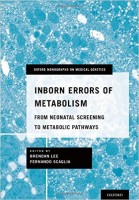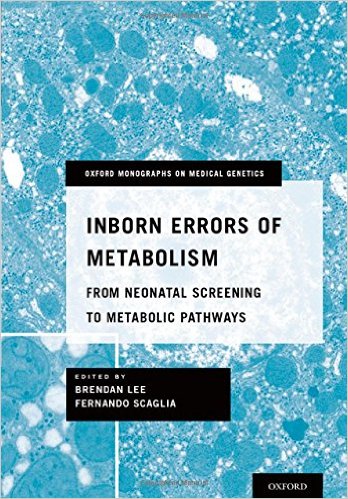 Editors: Brendan Lee, MD, and Fernando Scaglia, MD
Editors: Brendan Lee, MD, and Fernando Scaglia, MD
Publisher: Oxford University Press – 366 pages
Book Review by: Hiro Motiram
I believe most people do not know that arthritis, brain damage, cardiovascular disease, deformities (of body parts and organs), diabetes, liver failure, mental retardation, spleen enlargement, and many other conditions can be caused by metabolic disorders. What we’ve named here are some of the more severe consequences of metabolic disorders. Even coma and death can, and have resulted from severe metabolic imbalances in our bodies.
What exactly is metabolism? There are many definitions of this term. One of the simplest ways to define it is to state that it is essentially a process. (It’s also a sum of several different processes, but let us just use the simple definition here).
One way to understand a process is to know its intended purpose or outcome. From this perspective and with regards to humans, metabolism is a biochemical process that coverts food components (carbohydrates, fats, nucleic acids, and proteins are the four main types) into energy and other molecules required by our bodies.
Metabolism, as a chemical process that takes place in the cells and fluids in our bodies, enables the absorption of nutrients and minerals from food into buildup of large molecules, then breakdown of large molecules and their conversion into small molecules, and eventually, the production of energy from these chemical reactions.
The chemical steps in metabolism are catalyzed by enzymes. Enzymes are essential in the metabolic process. So when there are inborn errors of metabolism (the focus of this book), our bodies cannot correctly metabolize the components of our food into energy. Various problems then occur and affect us adversely.
In this book, you will learn about and understand the various processes in metabolism, and how inborn errors of metabolism result in chemical deficiencies that in turn cause some of the conditions we mention in our first paragraph.
Thirty-nine specialists in areas of medicine related to biochemistry, endocrinology, genetics, genomic medicine, metabolism, pediatrics, and others, from the United States and Canada, Germany, Israel, Italy, Saudi Arabia, and Sweden, wrote the 16 chapters of this book as we list below to give you a broad overview of what you will find in it:
- Newborn Screening
- Newborn Screening for Inborn Errors of Metabolism: Introduction
- Pathways
- Human Glycosylation Disorders: Many Faces, Many Pathways
- Gluconeogenesis
- Branched Chain Amino Acid Disorders
- Glycolysis
- Urea Cycle: Ureagenesis and Non-Ureagenic Functions
- Fatty Acid Metabolism and Defects
- Mitochondrial Disorders
- Cholesterol, Sterols, and Isoprenoids
- Disorders of One-Carbon Metabolism
- Neurotransmission and Neurotoxicity (Phenylketonuria and Dopamine)
- Therapeutic Approaches
- Cell and Organ Transplantation for Inborn Errors of Metabolism
- Gene Replacement Therapy for Inborn Errors of Metabolism
- Enzyme Replacement and Other Therapies for the Lysosomal Storage Disorders
- Chaperone Therapy for the Lysosomal Storage Disorders
- Substrate Deprivation Therapy
The materials in each chapter are organized in the following order which enables you to better learn, understand, and retain the main and subsidiary concepts explained in the various topics.
- History or Introduction
- Topics of discussion
- Subtopics
- Final Thoughts or Future Directions
- References
This is an excellent volume on metabolism in general and inborn errors of metabolism in particular. It provides you the opportunity to understand various metabolic disorders, and the chemical and physiological processes involved in complex diseases. Numerous charts, drawings, tables, and other visual elements are provided to assist you in the learning process.
Editors:
Brendan Lee, MD, PhD is Professor and of the Department of Molecular and Human Genetics at Baylor College of Medicine in Houston, Texas. As a pediatrician and geneticist, Dr. Lee studies structural birth defects and inborn errors of metabolism. In the area of metabolic disease, he is developing new treatments for maple syrup urine disease and urea cycle disorders.
Fernando Scaglia, MD is a Professor in the Department of Molecular and Human Genetics at Baylor College of Medicine in Houston, Texas. His primary research interests include the natural history and molecular characterization of mitochondrial cytopathies, clinical trials for Leigh syndrome, and the study of nitric oxide and glucose metabolism in patients with MELA syndrome. He is also affiliated with Texas Children’s Hospital in Houston, Texas.






